NEWSLETTER
Table of Contents:
In August you can register for the free online courses of Estonian language
Estonian Language Houses ended the spring season with exciting study visits
How can I study and practice language on my own during the summer?
Language Roulette: practice Estonian even on the beach!
16 language learners have been selected for the lead roles of the rap opera "Karma"
The Integration Foundation is looking forward to applications for integration awards
Open calls for tenders and calls for proposals
In August you can register for the free online courses of Estonian language

On August 18th at 10 a.m., registration for the free Estonian language courses will start on the website of the Integration Foundation. A total of 157 courses can be registered for, where 2,512 adults interested in Estonian language are welcome.
The Integration Foundation provides free Estonian language of communication courses at A1, A2, B1, B2 and C1 levels. Adults at least 18 years of age can register for the courses. The courses start on August 24th.
In order for the registration to go smoothly, it is recommended that you read the rules for course registration and test your language skills in advance, which can also be done on the Foundation's website.
In addition to online registration, it is also possible to access the free Estonian language courses through counselling. As a result of the counselling, we will record your wishes and opportunities, and later invite you to study at the Integration Foundation's Estonian Language Houses or a suitable course provider.
Additional information on the possibilities of learning and practicing the Estonian language, as well as counselling, is available by calling the free-of-charge information line 800 9999 or by e-mail info@integratsiooniinfo.ee.
Estonian Language Houses ended the spring season with exciting study visits
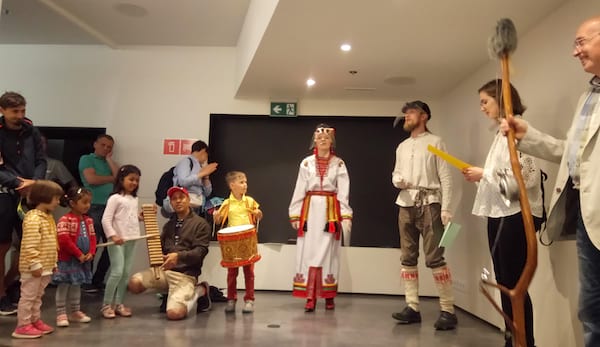 The Estonian language courses of the Estonian Language Houses of the Integration Foundation traditionally end with study visits. During these visits, language learners will gain new knowledge about Estonian culture, history, art, nature, etc. Study visits are part of the curriculum of language courses and offer the language learner an additional opportunity to practice Estonian in an exciting language environment.
The Estonian language courses of the Estonian Language Houses of the Integration Foundation traditionally end with study visits. During these visits, language learners will gain new knowledge about Estonian culture, history, art, nature, etc. Study visits are part of the curriculum of language courses and offer the language learner an additional opportunity to practice Estonian in an exciting language environment.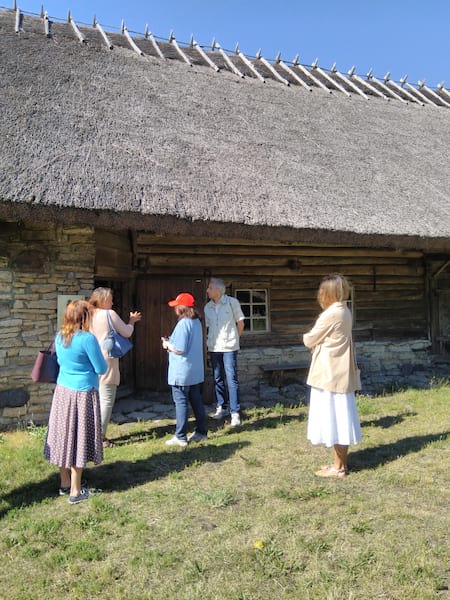
The groups who graduated this spring and summer had the opportunity to get an exciting overview of the Finno-Ugric peoples at the Estonian National Museum in Tartu, get acquainted with Tallinn's legends, review the refreshed exhibition in Museum and Visitor Centre of Fat Margaret and listen to exciting stories about sailing in and around Estonia, visit Tallinn TV Tower and the Botanical garden and participate in a quiz.
Estonian language students learned in the Viimsi Coastal People's Museum and Open-Air Museum how the coastal people near Tallinn lived, how the sprat pie tastes and what is called the sprat shell view.
The forest game on the nature study trail in Põhja-Kõrvemaa helped the language learners to get to know the names and leaves of the trees and what sound the frog or the stork makes. While adventuring in the forest with a smart board, answers to interesting questions about mushrooms, birds and trees were found.
How can I study and practice language on my own during the summer?
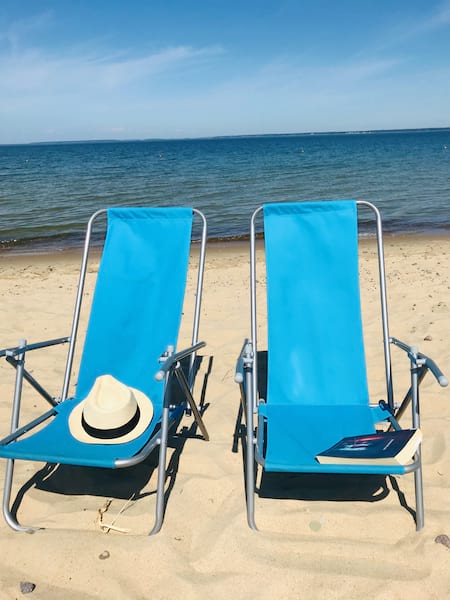
If you wish to study Estonian and practice it during the summer independently, you can do it with the help of a computer or a smart device for free.
Please check the possibilities on the website of Integration Foundation.
We also offer a possibility to practice Estonian in a new format of short conversations of Language Roulette in the Zoom environment. Read more HERE.
Language enthusiasts can also hone their skills at Estonian language and culture clubs or Estonian language cafés.
Language Roulette: practice Estonian even on the beach!
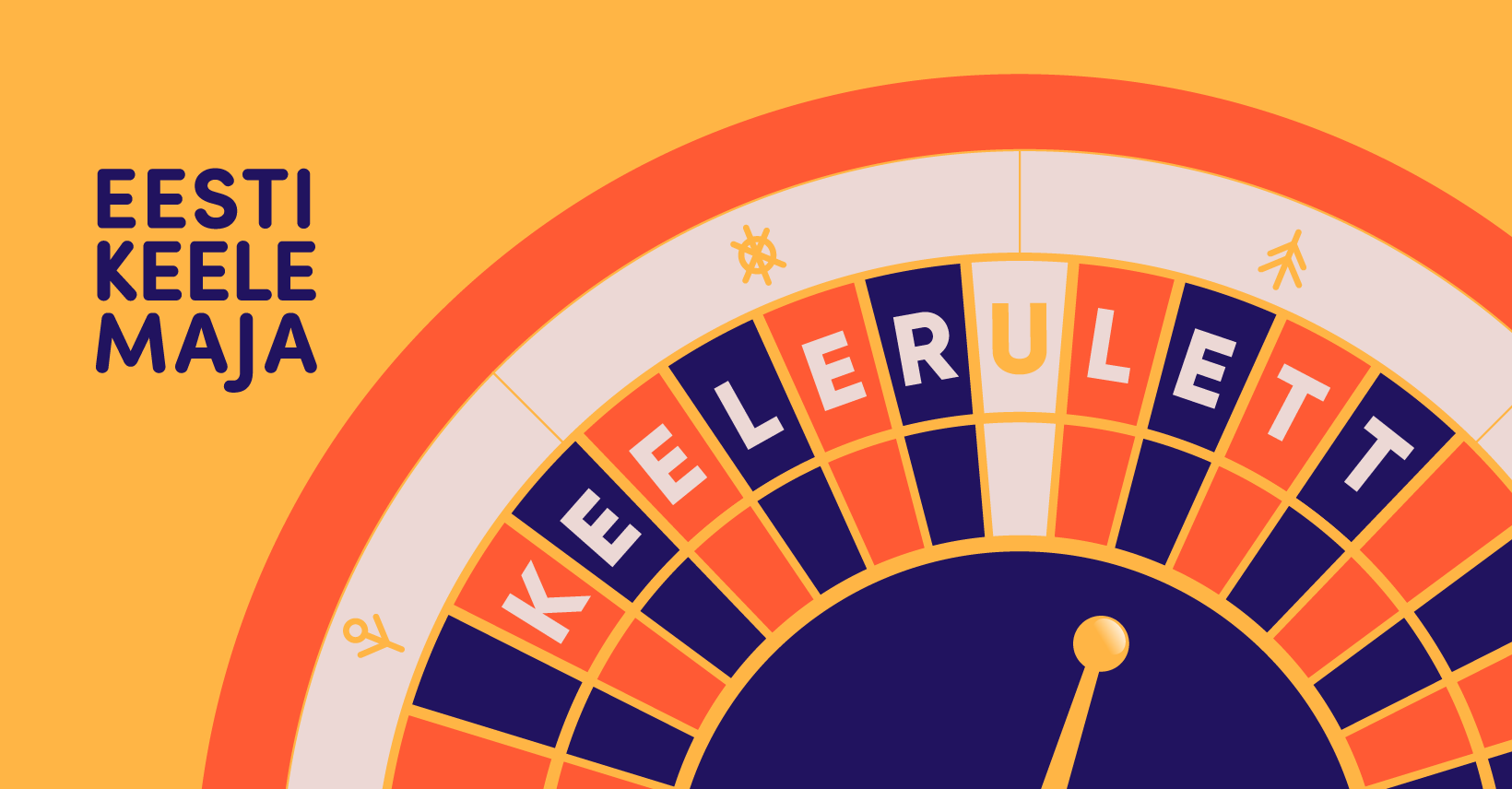
Language Roulette is a series of virtual meetings coorganized by teachers and mentors of the Estonian language houses of the Integration Foundation, which brings together people who want to practice Estonian in a new format of short conversations in the Zoom environment.
Participants of the Language Roulette can chat for a limited time in Estonian on a given topic in a random group. After that, the group will be changed and a new conversation on the new topic will begin. Both language learners and mentors who speak Estonian at the level of native speaker will participate in the conversations.
All conversations will be taking place in the Zoom environment. During the summer, everyone can participate in the Language Roulette on July 21, August 4 and August 18 at 6 p.m.
Registration information will be rountinely added to the Estonian language house Facebook page and the Calendar of Events of the Integration Foundation.
We will send the Zoom meeting address to the participants after registration.
Sõnaveeb and Sõnaveeb for Learners – new dictionary portals of the Institute of the Estonian Language

Last year the Institute of the Estonian Language launched the Sõnaveeb language portal, which is designed to help those who speak Estonian as their mother tongue as well as those learning the language. The portal brings information on the language together in one place: new words and expressions, explanations, sample sentences, collocations, etymology, declensions and conjugations and word games. This year Sõnaveeb has been given a significant update, described below by the institute’s computational lexicographer Jelena Kallas.
What new possibilities do you offer for the users of Sõnaveeb?
The new Sõnaveeb boasts a lot more lexicons than it used to. The previous version only had general Estonian dictionaries, Estonian-Russian dictionaries and a database of morphological forms for Estonian, but the new version also features terminological dictionaries. Now you can enquire about a specific word in one place and see what matches come up in a variety of domains.
Searches within terminological dictionaries can be carried out in a range of languages, too – not just Estonian, English and Russian, but also, for example, Latin, Greek, German and French.
Also, In 2020 we have launched new portal aimed at learners of Estonian as a Second or Foreign Language called Keeleõppija Sõnaveeb - Sõnaveeb for Learners.
What does Sõnaveeb for Learners have to offer language learners?
Sõnaveeb for Learners features the 5000 most frequent and important words in Estonian, which is the amount you need to master in order to speak the language at the A2 or B1 level. So, there are fewer words and information is displayed in a simpler way: the explanations are shorter, there’s less additional material and the explanations are accompanied by images and comments for learners.
The portal provides all the help learners need in writing and speaking Estonian and understanding the meaning of words in the language. When you search for a word, you can check its basic meanings and all word forms. For nouns, you can view all 14 cases in both the singular and plural. You can also listen to check the pronunciation – basic word forms were read out loud for recording by Estonian actors.
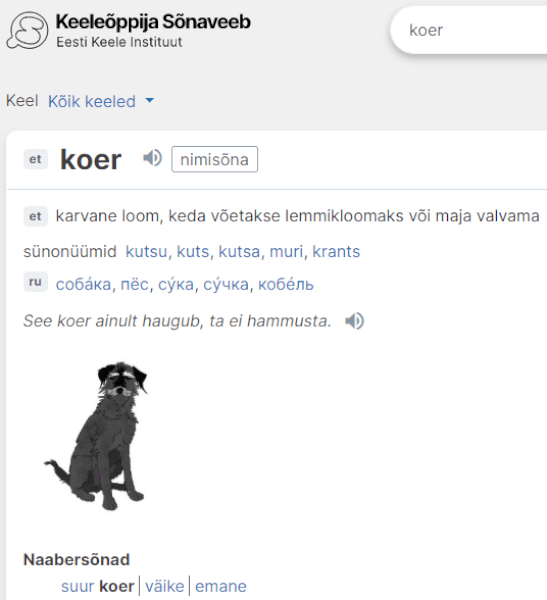
Anyone writing in the language will also be helped by the collocations. Collocations are words that are frequently used together. For example, if you need to write something about a dog (koer), Sõnaveeb will offer the Estonian collocations for things like ‘stray dog’ (kodutu koer), ‘dog barks’ (koer haugub), ‘get a dog’ (koera võtma) and ‘walk a dog’ (koeraga jalutama). The learner can then pick and choose the ready-made phrases they need for their text. In addition to collocations, it will also offer example sentences from the corpus, in this case web texts in Estonian.
On top of that, we’ve also highlighted the grammatical forms that a word requires from the words around it – so for example if you enter the word minema (‘to go’), you get things like kuhu (‘where’) and millega (‘by what means’). Then there are phrasal verbs as well. Again, taking the example of minema, Sõnaveeb will offer things like katki minema (‘to break’), lahku minema (‘to break up’) and so on. And each one can be clicked on separately to see what it means and how it’s used.
Then there’s the ‘Learn Estonian’ page, which explains how to write things like letters, postcards, invitations, statements, authorisation documents and CVs and has information on punctuation, numbers, abbreviations and other useful stuff.
The dictionaries on the website of the Institute of the Estonian Language provide lots of extra opportunities for language learners, too. Further down the line the plan is to transfer some of them over to Sõnaveeb as well.
What support does Sõnaveeb offer teachers of Estonian?
There’s now a separate section on the site called “Teacher’s Tools” that will be of help to language teachers and other specialists involved in language studies in planning courses and putting together teaching materials, exercises and tests. It also allows you to view the vocabulary lists for different language proficiency levels and descriptions of grammar competence.
Sõnaveeb can be found online at sonaveeb.ee. Keeleõppija Sõnaveeb (Sõnaveeb for Learners) can be found online at sonaveeb.ee/lite. Both portals are able to be used on mobiles and available in three languages. The Institute of the Estonian Language constantly updates and develops Sõnaveeb and Keeleõppija Sõnaveeb , including on the basis of user feedback.
16 language learners have been selected for the lead roles of the rap opera "Karma"
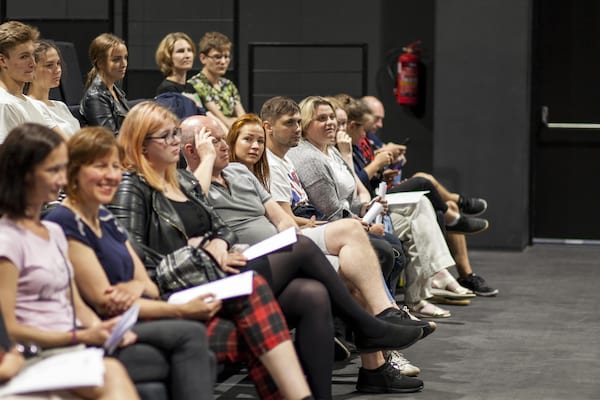
This spring, the Estonian Language House of the Integration Foundation in Narva started a unique Estonian language learning project - production of the rap opera "Karma". At the theater seminar held last weekend, 16 language learners from Ida-Viru County were selected for the lead roles of the rap opera. Dozens of additional people interested in practicing the Estonian language will be involved in dance and mass scenes.
Forty residents of Ida-Viru County with mother tongues other than Estonian took part in the virtual auditions of the rap opera that was announced in April. The final choice of the main actors was made by the rap opera's creative team at a three-day seminar last weekend, where participants had to improvise rap opera scenes, participate in singing lessons and dance with choreographers.
“Because of the state of emergency, we had to organize virtual experiments at the beginning, so the seminar gave us the opportunity to really understand who we are dealing with. The creative team, together with the producer, director, music director, stage artists and choreographers, constantly watched the participants and discussed who would be suitable for which role,” said Krismar Rosin, Estonian language teacher at Narva Estonian Language House, author of the idea of the rap opera, screenwriter and producer.
Teno Kong, the music director of the rap opera, tested the singing skills of the participants and Neeme Kuningas, the director, their vocal strength and stage charisma. Choreographers Valeria Vertoshkina and Ulyana Lint performed one of the dance programs of the rap opera scenes, which they later tried to perform together with the participants.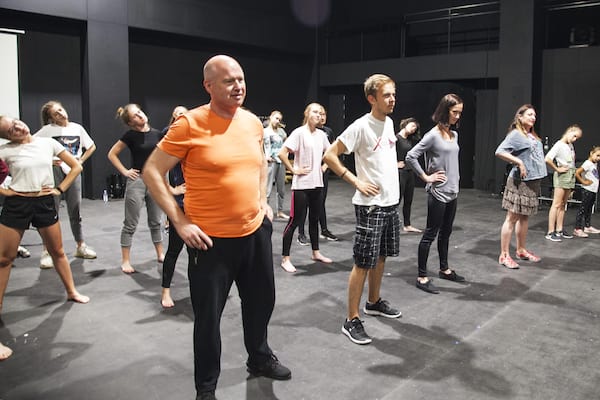
"We could have fun together by moving around after awesome dialogues and singing lessons. Honoring the truth, we saw insanely good improvisation skills and amazing solutions, and we feel that with the help of the participants, we will get even more excitement and spark in the rap opera,” added Krismar Rosin.
The rap opera "KARMA" will be performed twice and with two different ensembles. Most of the selected people are Estonian language learners from Ida-Viru County who have never acted or sung before.
The rap opera premiere will take place at the Narva Vaba Lava on September 19. The additional performance will take place on September 20. Performances are free and can be redeemed by pre-registration. Registration will open in early September.
Photos by Maria Ailma
The Integration Foundation is looking forward to applications for integration awards
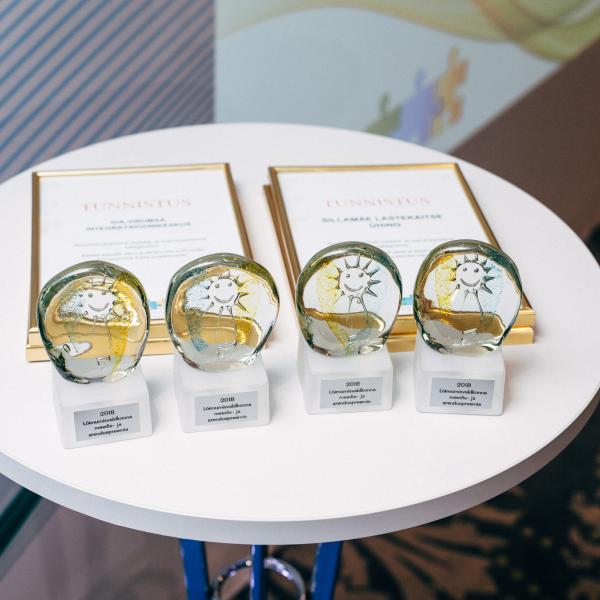
Applications are welcome to the Integration Foundation for receiving awards for projects carried out in the field of integration. Applications can be submitted by both legal entities registered in Estonia and natural persons living here, who in the period from October 2019 to September 2020 have contributed to the introduction of various cultures and implemented projects supporting cooperation between people with different mother tongues. The deadline for applications is 23 September 2020.
"By awarding prizes in the field of integration, we wish to recognize the players around us who build bridges between representatives of different communities and cultures, who help them find a common language and give a boost to their cooperation," said Kristina Pirgop, Head of National Minorities at the Integration Foundation. "To the competition, we look forward to projects that started at the end of last year, as well as those that started or are just about to start this year and will end in September," Kristina Pirgop added.
The integration prize fund is EUR 4,000. The prizes will be awarded in four categories and the best project promoter of each category will receive a prize of EUR 1,000.
Applications for awards can be submitted in the following categories:
- Cultural Introducer of the Year (introduction of the cultures of national minorities living in Estonia to the Estonian public);
- Bridge Builder of the Year (implementation of cooperation projects between native Estonians and non-Estonian residents);
- Message Carrier of the Year (development of attitudes supporting integration through the media);
- Spark Organization of the Year (implementation of outstanding activities in the field of integration).
Projects with the implementation period between 01.10.2019 - 22.09.2020 can be submitted to the competition.
Applications can be submitted in several categories, but in this case, different projects or activities must be proposed in each category. The competition is not open to legal or natural persons who have already received an integration award in the last three years.
To participate in the competition, you must fill in the application form available on the Integration Foundation’s website. The Competition Guide can be found on the same page. The completed application must be sent to the Integration Foundation’s address taotlus@integratsioon.ee with the comment “Nomination - Integration Awards 2019-2020" by 23 September 2020.
The names of the prize-winners will be published on the website of the Integration Foundation and the awards will be presented at the end of 2020.
The Integration Foundation has been awarding prizes for integration development projects since 1999 and for media projects since 2009. The fund of the Integration Award Competition 2019-2020 is financed by the Ministry of Culture.
Open calls for tenders and calls for proposals
Information on the announced calls is published on the Integration Foundation's website at integratsioon.ee/konkursid.
Our calendar
Information on events that take place by our organisation, participation or support, can be found in the calendar published on our website.
Our news
You can read the latest announcements of the Integration Foundation in the news section of our website and on the Facebook page of the Integration Foundation or the Estonian Language House.
